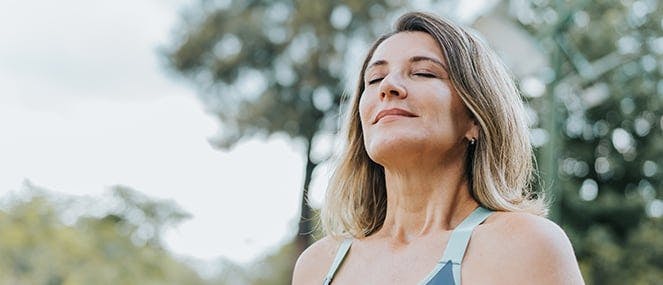
- Health hub/
- Tips & Advice on Cold, Flu & Boosting Immunity/
- Can exercise support your immune health?


Exercise is beneficial for many reasons, Exercise Sports Science Australia accredited Exercise Physiologist Rob Murray explains, it helps strengthen your muscles and bones, improves your ability to perform daily activities, reduces your risk of falls, and it generally increases your chances of living longer. It helps to reduce pain, support mood and promote better sleep.
The Benefits of Exercise for Immune health
One less known benefit of exercise Murray says, is that it improves your immune system health.
“It does this by promoting blood and lymphatic flow around the body. The cardiovascular system has the heart to pump blood, however, the lymphatic system doesn't have its own pump, so relies on muscle contraction through movement to help increase the flow of lymphatic fluid around the body. Specifically, exercise helps to circulate the highly specialised immune cells, such as natural killer cells and T cells, contained within the lymphatic fluid, making them roam the body at a higher rate and in higher numbers, which find pathogens (like viruses) and take them out.”
The general Levels of inflammation in active people are much lower, whereas those who are obese, are in a constant state of chronic, low-grade inflammation, with their defences constantly in fight mode. Physically fit people’s immune system activity levels are lower as they don’t need to be constantly fighting all kinds of minor conditions. That means their immune system can spring into action much more effectively when there is a real problem.
When you exercise, you use a lot of oxygen, in turn creating a lot of free radicals. When this oxidative stress happens, your immune system is triggered to capture the free radicals. So exercise initially increases oxidative stress, but, in doing so, exercise also helps develop the mechanisms for dealing with it, resulting in less oxidative stress in the long term.
How to exercise to maintain immune health?
“We get an acute response from our immune systems when we exercise”, Murray explains, “but that will eventually go away, unless we keep working at it consistently. The more regular the bouts of exercise we complete, the better our immune systems will be. It's not enough to just do a bout of exercise here and there, without consistency, and expect to have an efficient, illness-clearing immune system. Regular movement will prepare your body to wipe out those nasty, sickness-causing germs, even as you get older. Think of it like regularly cleaning your house or tending to your garden. If these aren't done consistently then things will become untidy or overgrown.”
Murray suggests that adults should aim for:
- 150 to 300 minutes (2.5 to 5 hours) of moderate intensity physical activity, such as a brisk walk, golf, mowing the lawn or swimming
- 75 to 150 minutes (1.25 to 2.5 hours) of vigorous intensity physical activity, such as jogging, aerobics, fast cycling, soccer or netball
- an equivalent combination of moderate and vigorous activities
“Muscle-strengthening activities should also be included on at least 2 days each week in the form of body weight exercises, such as push-ups, pull-ups, lifting weights, such as with dumbbells, or household tasks, such as activities that involve lifting, carrying and digging."
Little movement, a lot is better than none
Walking five or more days of the week lowers the number of upper-respiratory tract infections (such as the common cold) by more than 40 per cent. The value of moderate level of intensity exercise such as brisk walking, for a specified duration, (usually 30 minutes). “This is paced at a level that makes you breathe faster and feel warmer but where you can still hold a conversation. You’re not overexerting yourself.”
This makes it accessible and easier to start with, she writes, and that we can top this up with small amounts of higher intensity training.
Overtraining can be counterintuitive, severely disrupting the body’s defences. Minimal movement, often, can set your lymphatic fluid in motion, with the result that waste products are removed from your system more quickly. It’s better to move a little every hour than to sit around all week on your chair or couch and then go for a three-hour run on Sundays.
Recovery
To keep your immune strong, recovery is also crucial.
Refuel with dietary carbohydrates to ensure you have enough energy in your body to support your daily activities, such as your energy-intensive immune system.
Replenish with vitamins and minerals to support energy production and provide antioxidant functions that are important for the immune system.
Exercising for immune health as we age
As we age, our immune system becomes less resilient and our first, second and third lines of defence begin to function less well. The older our cells get, the more at risk we are from infections which develop because our defences become less active in detecting the mini infections they have to clear up every day. The more active older people remain, the fitter their defence cells will stay, the higher the quality of their T lymphocytes will be and the less quickly they would become sick.




